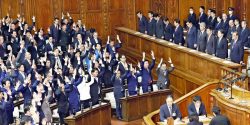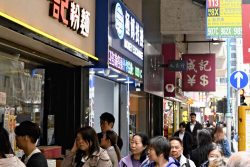- Yomiuri Editorial
- Japan-U.S. summit
Take leadership in protecting international order through unwavering alliance / Enhance effectiveness of IPEF initiative
13:37 JST, May 24, 2022
As the international community is being threatened by Russia’s three-month-long invasion of Ukraine, it is significant that the leaders of Japan and the United States affirmed their cooperation on a wide range of issues, including U.N. reform and the global economy.
Prime Minister Fumio Kishida has held a summit with U.S. President Joe Biden in Tokyo. This was the first in-person summit between the two since they became each country’s respective leader. It is important to further deepen collaboration among each country concerned for regional stability through the Japan-U.S., U.S.-South Korea and Japan-U.S.-Australia-India frameworks.
Japan and the United States, which emphasize universal values such as freedom, democracy and the rule of law, have a responsibility to strengthen their alliance and take the lead in maintaining the international order.
Provision of extended deterrence
During the summit, Kishida said, “Japan and the United States — two nations that share fundamental values — should strongly lead the international community to realize a free and open Indo-Pacific based on the rule of law.”
Biden stated, “The U.S.-Japanese alliance has long been the cornerstone of peace and prosperity in the Indo-Pacific, and the United States remains fully committed to Japan’s defense.” This confirmed that the United States will provide extended deterrence to Japan, including through its nuclear umbrella.
The Japan-U.S. joint leaders’ statement condemned Russia and expressed “deep concern” over Moscow’s abuse of its veto in the U.N. Security Council. Biden declared his support for Japan to become a permanent member of the Security Council.
The joint statement stressed that Japan and the United States concurred to work together not only to call on China, which is increasing its nuclear capabilities, to agree to nuclear disarmament talks, but also to “strengthen deterrence to maintain peace and stability in the region.”
They also reiterated “the importance of peace and stability across the Taiwan Strait.”
Due to China’s rapid military buildup, the military balance between the United States and China is leaning toward Beijing’s advantage in East Asia. North Korea is accelerating its nuclear and missile development.
Russia’s invasion of Ukraine has underscored the importance of securing deterrence against autocratic states. So as not to allow unilateral changes to the status quo in East Asia, it is essential that U.S. deterrence functions effectively for the security of allies of the United States.
At the same time, Japan will be tasked with improving its ability to respond to missile and other attacks through further defense efforts of its own. Kishida has expressed his determination to secure a substantial increase in Japan’s defense spending, which will put his leadership ability to the test.
Adjustments for counterattacks
Japan is considering possessing counterattack capabilities to deal with armed attacks. The close cooperation between the Self-Defense Forces and the U.S. military will be a prerequisite for such operations.
Japan and the United States should coordinate concrete policies and expand their cooperation, such as through joint exercises, under the respective national security strategy each is formulating.
Biden has announced the establishment of a new economic initiative called the Indo-Pacific Economic Framework. The United States, Japan, Australia, South Korea and India are among the 13 nations that are participating in IPEF.
Washington’s engagement with Asia on the economic front has waned since previous U.S. President Donald Trump decided to pull the United States from the Trans-Pacific Partnership (TPP) free trade agreement.
During this time, China has been attempting to take the initiative in the Asian trade by joining the Regional Comprehensive Economic Partnership (RCEP) agreement that involves 15 countries including Japan, South Korea and the Association of Southeast Asian Nations (ASEAN), as well as applying to join the TPP.
It is welcoming that the United States has indicated its intention to strengthen its influence in Asia again through IPEF.
IPEF will focus on four areas: trade facilitation, including in the digital sector; the establishment of resilient supply chains; the improvement of infrastructure and decarbonization; and taxation and anti-corruption.
IPEF member countries are expected to promote preparations, through such measures as establishing rules and concluding intergovernmental agreements, to allow them to participate in one or more areas of their choice. It is important to establish a transparent framework that will serve as the basis for further economic development in the Asia-Pacific region.
On the other hand, unlike the TPP, IPEF does not include the elimination or reduction of tariffs. This is because there are strong concerns in the United States about IPEF’s negative impact on jobs.
Basis of Asian development
Many ASEAN member states reportedly expect the opening of the U.S. market in return for them agreeing to the establishment of IPEF rules. In order to have IPEF lead to regional development, it is vital to have emerging and developing countries feel the benefits from the new framework.
There is a need to come up with effective assistance through IPEF in areas where ASEAN has lagged behind, such as infrastructure investment and decarbonization. Japan should take into account the needs of each ASEAN nation and coordinate with the United States.
Essentially, it would be desirable for the United States to return to the TPP. Japan must continue to explain to the United States that the TPP is the best way to strengthen U.S. engagement in Asia.
(From The Yomiuri Shimbun, May 24, 2022)
Top Articles in Editorial & Columns
-

40 Million Foreign Visitors to Japan: Urgent Measures Should Be Implemented to Tackle Overtourism
-

University of Tokyo Professor Arrested: Serious Lack of Ethical Sense, Failure of Institutional Governance
-

Policy Measures on Foreign Nationals: How Should Stricter Regulations and Coexistence Be Balanced?
-

China Provoked Takaichi into Risky Move of Dissolving House of Representatives, But It’s a Gamble She Just Might Win
-

PM Takaichi Should Help Young Japanese Break Seniority Barrier to Vitalize Politics
JN ACCESS RANKING
-

Japan Institute to Use Domestic Commercial Optical Lattice Clock to Set Japan Standard Time
-

Israeli Ambassador to Japan Speaks about Japan’s Role in the Reconstruction of Gaza
-

Man Infected with Measles May Have Come in Contact with Many People in Tokyo, Went to Store, Restaurant Around When Symptoms Emerged
-

China Eyes Rare Earth Foothold in Malaysia to Maintain Dominance, Counter Japan, U.S.
-

Prudential Life Insurance Plans to Fully Compensate for Damages Caused by Fraudulent Actions Without Waiting for Third-Party Committee Review



















